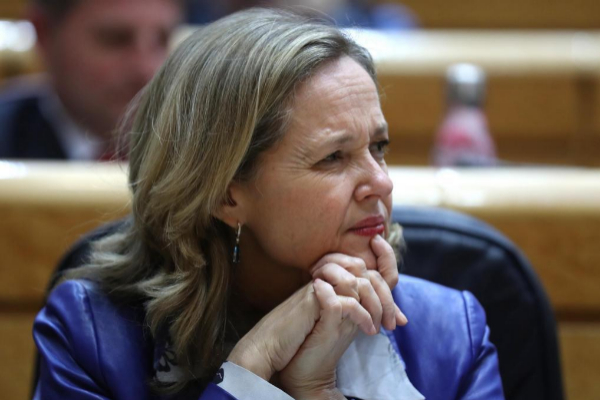- Markets: The Fed lowers rates by surprise at the impact of the coronavirus
- Spain: Coronavirus infection risk map
The US Federal Reserve has taken action to raise a solid firewall against the economic threat posed by the coronavirus. By surprise, the institution announced yesterday a reduction of 50 basis points in the rates, until leaving them in the range of 1% -1.25%, to mitigate the risks of Covid-19 in the economy. "The coronavirus presents evolving risks to economic activity," the Fed said in a later statement.
No one expected such a measure in this way - without holding the meeting of the Open Market Committee, where such decisions are normally taken - or at this time; The last time the Fed made a similar cut was in October 2008 , when the US economy collapsed due to the subprime mortgage crisis .
In addition, just two hours before the announcement, the Economy Ministers and the central bankers of the powers that make up the G-7 ( Germany, Canada, the United States, France, Italy, Japan and the United Kingdom ) had held a telematic meeting and were they had committed to "use all appropriate political tools to achieve strong and sustainable growth, as well as to protect against downside risks" of the potential impact of the coronavirus on global growth.
Perhaps that is why the news of the Fed caused an initial confusion throughout the financial world, starting with the stock exchanges, which lived a few minutes of shock before defining their definitive path, and following the investors, who rushed to try to understand the reason after the surprise cut of the Fed.
Donald Trump had pressed again for the Federal Reserve to carry out such an action, but this did not seem enough. The US president's attacks on the Fed and its president, Jerome Powell , are a constant and, on this occasion, that did not seem to be the main reason behind the measure.
The analyzes mostly agree that the Federal Reserve has wanted to anticipate the possible impact of the coronavirus and trace a security perimeter that guarantees the recovery of the cycle once the health epidemic is controlled. "The coronavirus threatens to derail the revival of global growth and, faced with this risk, the Fed has acted by surprise," explains Keith Wade , chief economist at Schroders . This step "should provide some comfort to the markets, boost people with loans and help maintain confidence," says James McCann , senior global economist at Aberdeen Standard Investments .
Transmitting tranquility seems to be another of its objectives, in the opinion of Anna Stupnytska , director of global macro at Fidelity International. "The strong sales of last week have forced the Fed to take this preventive measure. It is a strong signal from the bank, and intelligent at the same time, by moving forward in a month to a cut that was already expected," he says.
The questions now are whether the measure will work and how the other central banks will respond. Regarding the first, Gonzalo de Cadenas-Santiago , director of macroeconomic and financial analysis of the Mapfre Research Service, points out that "there is a real fear and a productive and commercial disruption that is not fixed by lowering the price of money, but with mechanisms that help to transit the productive impasse and slow down the fall in the value of assets globally, especially the most illiquid ones. "
Regarding the second, all eyes are directed to the ECB. "We anticipate that the institution will guarantee greater volume of purchases and a pause in the revision of the strategy announced by its president," says Cadenas-Santiago. For Anna Stupnytska, central banks should not act in isolation, but that "governments should support with timely and well-designed fiscal measures "to the consequences of the virus.
Eurogroup
This Wednesday will be another opportunity to learn how institutions and governments around the world respond to the economic impact of the coronavirus.
The Eurogroup and the IMF will address the issue throughout the day. As the third vice president of the Government for Economic Affairs, Nadia Calviño, advanced yesterday, she herself will participate in a Eurogroup teleconference and another one in which the International Monetary Fund (IMF) will also be represented to analyze the effects of the virus on the economy .
"We have to see if it is necessary to take measures at a national or more general level for the eurozone as a whole," Calviño said in statements in the Senate collected by the Efe agency.
Calviño explained that in Spain the analysis is based on the recommendations of the health authorities and that at the moment the forecasts of economic impact "are not significant", although taken with the caution that implies a situation in which the scope and the scope are still unknown. duration of the disease
"The Government will be prepared to act in case the scenario changes," he said, although he also insisted that all the analyzes foresee a transitory impact, of short duration and with an economic recovery in the coming quarters.
According to the criteria of The Trust Project
Know more- Coronavirus
- Covid 19
Health Those infected by the coronavirus in Italy exceed 370, including four minors
Andalusia A doctor from Málaga has been sent to take 300 masks from the hospital for the residents of his town
CoronavirusJoan Ribó on the coronavirus in Fallas: "We will take the necessary measures that, at this time, are zero."

